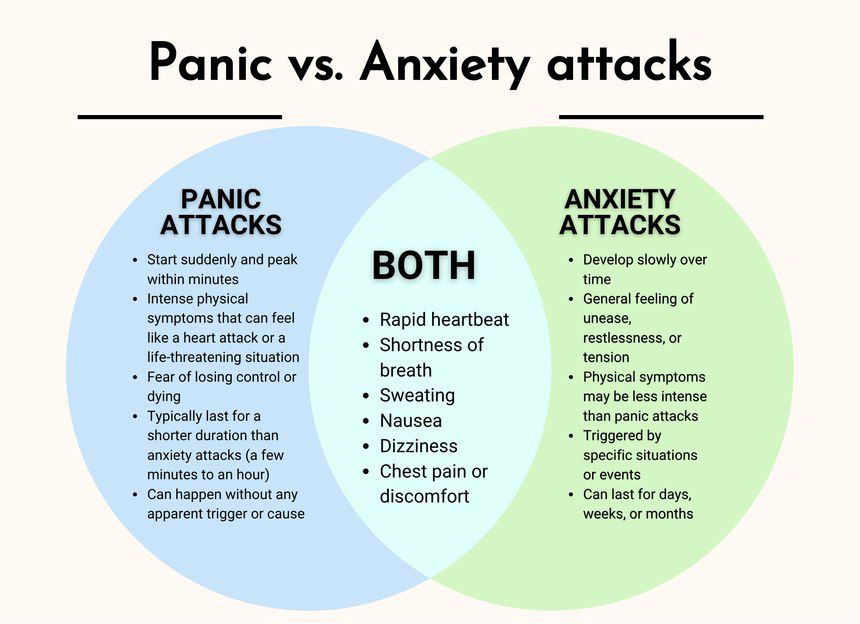
Differences Between Panic and Anxiety Attacks
Anxiety and panic attacks are often used interchangeably, but they are distinct conditions with different symptoms, triggers, and durations. Understanding these differences is crucial for those experiencing them and for loved ones offering support. At Cordial Psychiatry in Yonkers, NY, we help patients manage and overcome anxiety-related conditions through expert care and personalized treatment plans. Panic and anxiety attacks are often confused, but they have distinct differences that affect how they are managed and treated. At Cordial Psychiatry in Yonkers, NY, we specialize in helping individuals understand these conditions, identify their triggers, and find effective treatment. Let’s explore how panic and anxiety attacks differ and what you can do to regain control over your mental health.
This article explores the differences between panic and anxiety attacks, their symptoms, causes, treatments, and ways to cope.
What Is an Anxiety Attack?
Anxiety attacks are episodes of intense worry or fear, often associated with stress or overwhelming situations. Unlike panic attacks, they tend to develop gradually and can last for an extended period.
Symptoms of an Anxiety Attack
- Increased heart rate
- Muscle tension
- Difficulty concentrating
- Restlessness
- Sleep disturbances
- Excessive worry
Common Triggers for Anxiety Attacks
- Work stress
- Financial concerns
- Relationship problems
- Health issues
- Trauma or past experiences
What Is a Panic Attack?
Panic attacks are sudden, intense episodes of fear that peak within minutes and often occur without an apparent trigger. They can feel overwhelming and may mimic serious medical conditions like heart attacks.
Symptoms of a Panic Attack
- Rapid heartbeat or palpitations
- Sweating and chills
- Dizziness or lightheadedness
- Shortness of breath
- Chest pain
- Fear of losing control or dying
Common Triggers for Panic Attacks
- Phobias
- Chronic stress
- Traumatic experiences
- Substance abuse
- Medical conditions
Differences Between Panic and Anxiety Attacks
| Feature | Anxiety Attack | Panic Attack |
| Intensity | Gradual build-up | Sudden onset |
| Physical Symptoms | Mild to moderate | Severe and overwhelming |
| Duration | Prolonged | Short but intense |
| Trigger | Clear stressor | Often no obvious trigger |
Key Differences Between Panic and Anxiety Attacks
Onset and Duration
- Panic Attacks: Sudden onset, peaks within 10 minutes, and resolves quickly.
- Anxiety Attacks: Gradual onset, may last for hours or days.
Symptoms Intensity
- Panic Attacks: Severe, overwhelming physical and psychological symptoms.
- Anxiety Attacks: Milder, with prolonged worry and distress.
Triggers
- Panic Attacks: Can occur unexpectedly without an obvious trigger.
- Anxiety Attacks: Often linked to specific stressors.
Physical vs. Emotional Symptoms
- Panic Attacks: More physical (e.g., chest pain, dizziness, hyperventilation).
- Anxiety Attacks: More psychological (e.g., excessive worry, nervousness).
Impact on Daily Life
- Panic Attacks: Brief but disabling during the episode.
- Anxiety Attacks: Persistent and may interfere with daily tasks over time.
Diagnosis and Treatment Options
How Are Anxiety and Panic Attacks Diagnosed?
At Cordial Psychiatry, we use:
- Clinical evaluations
- Patient history assessments
- Psychological testing
- Medical rule-outs (to exclude physical conditions like heart disease)
Treatment Approaches
Medication
- Anti-anxiety medications: Benzodiazepines (short-term relief)
- Antidepressants: SSRIs and SNRIs for long-term management
- Beta-blockers: Help control physical symptoms like rapid heartbeat
Therapy Options
- Cognitive Behavioral Therapy (CBT): Helps change negative thought patterns
- Exposure Therapy: Reduces fear response to triggers
- Mindfulness-Based Stress Reduction (MBSR): Encourages relaxation techniques
Lifestyle Changes and Coping Strategies
- Regular exercise
- Adequate sleep
- Avoiding caffeine and alcohol
- Breathing exercises and meditation
When to Seek Professional Help
If you experience frequent panic or anxiety attacks that interfere with your daily life, it’s time to seek professional help. At Cordial Psychiatry in Yonkers, NY, our team specializes in diagnosing and treating anxiety disorders with personalized care.
How Cordial Psychiatry Can Help
At Cordial Psychiatry in Yonkers, NY, we provide:
- Personalized therapy plans
- Medication management
- Support groups
- Holistic treatment options
Conclusion
Understanding the differences between panic and anxiety attacks can help you manage symptoms more effectively. If you’re struggling with anxiety or panic attacks, Cordial Psychiatry in Yonkers, NY is here to help. Seeking professional support is the first step toward relief and recovery. Both anxiety and panic attacks can be distressing, but understanding their differences is the first step toward effective management. If you’re struggling with either condition, seeking professional guidance can make a significant difference in improving your quality of life. Contact Cordial Psychiatry in Yonkers, NY for expert mental health care and treatment options tailored to your needs.
FAQs
Can you have both anxiety and panic attacks?
Yes, individuals with anxiety disorders may experience both anxiety and panic attacks, though they differ in severity and duration.
What should I do during a panic attack?
Practice deep breathing, focus on grounding techniques, and remind yourself that the attack will pass.
Are panic attacks dangerous?
While they can feel life-threatening, panic attacks are not physically harmful. However, they can significantly impact quality of life and should be addressed with treatment.
Can anxiety attacks lead to panic attacks?
Yes, prolonged anxiety can sometimes escalate into a panic attack, especially when stress levels peak.
How can I prevent anxiety or panic attacks?
Regular exercise, stress management techniques, therapy, and medication (if prescribed) can help reduce the frequency of attacks.

